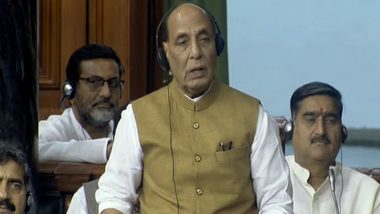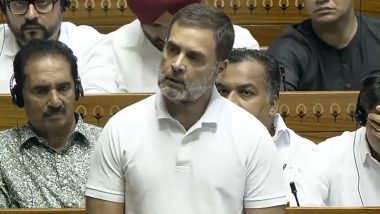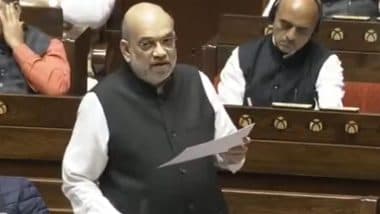New Delhi, August 4: The Lok Sabha has passed the Inter-Services Organisation (Command, Control and Discipline) Bill-2023, which seeks to empower commanders of inter-services organisations to exercise disciplinary or administrative control over personnel of the army, air force and navy serving under their command. Defence Minister Rajnath Singh, speaking on the Bill, said that the legislation is an important step in the direction of military reforms.
Currently, the Armed Forces personnel are governed in accordance with the provisions contained in their specific Service Acts - Army Act 1950, Navy Act 1957 and Air Force Act 1950. Inter-Services Organisations Bill 2023 That Seeks to Give Push to Theaterisation Passed in Lok Sabha, Rajnath Singh Says 'Important Step in Direction of Military Reforms'.
The enactment of this Bill will have various tangible benefits such as the maintenance of effective discipline in inter-service establishments by the Heads of ISOs, no requirement of reverting personnel under disciplinary proceedings to their parent Service units, expeditious disposal of cases of misdemeanour or indiscipline and saving of public money and time by avoiding multiple proceedings.
The Bill would also pave the way for much greater integration and jointness amongst the three Services; lay a strong foundation for creation of Joint Structures in times to come and further improve the functioning of the Armed Forces. Introducing the Bill in the Lok Sabha, Rajnath Singh termed it as part of a series of military reforms being undertaken by the government, with the aim to empower the nation. Delhi Ordinance Bill: Lok Sabha Passes Government of National Capital Territory of Delhi Bill 2023; Amit Shah Tears Into Opposition Alliance.
“I want to assure the House that this bill is an important step in the direction of military reforms. This bill does not include any additional financial implications,” he said. He described the bill as an important step taken towards “integration and jointness” among the Armed Forces to face the future challenges in an integrated manner.
The Bill is essentially an enabling act and it does not propose any change in the existing Service Acts/Rules/Regulations which are time-tested and have withstood judicial scrutiny over the last six decades or more. Service personnel when serving in or attached to an Inter-Services Organisation will continue to be governed by their respective Service Acts. What it does is to empower Heads of Inter-Services Organisations to exercise all the disciplinary and administrative powers as per the existing Service Acts/Rules/Regulations, irrespective of the service they belong to.
(This is an unedited and auto-generated story from Syndicated News feed, LatestLY Staff may not have modified or edited the content body)













 Quickly
Quickly





















